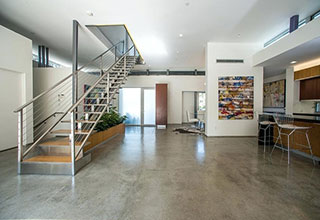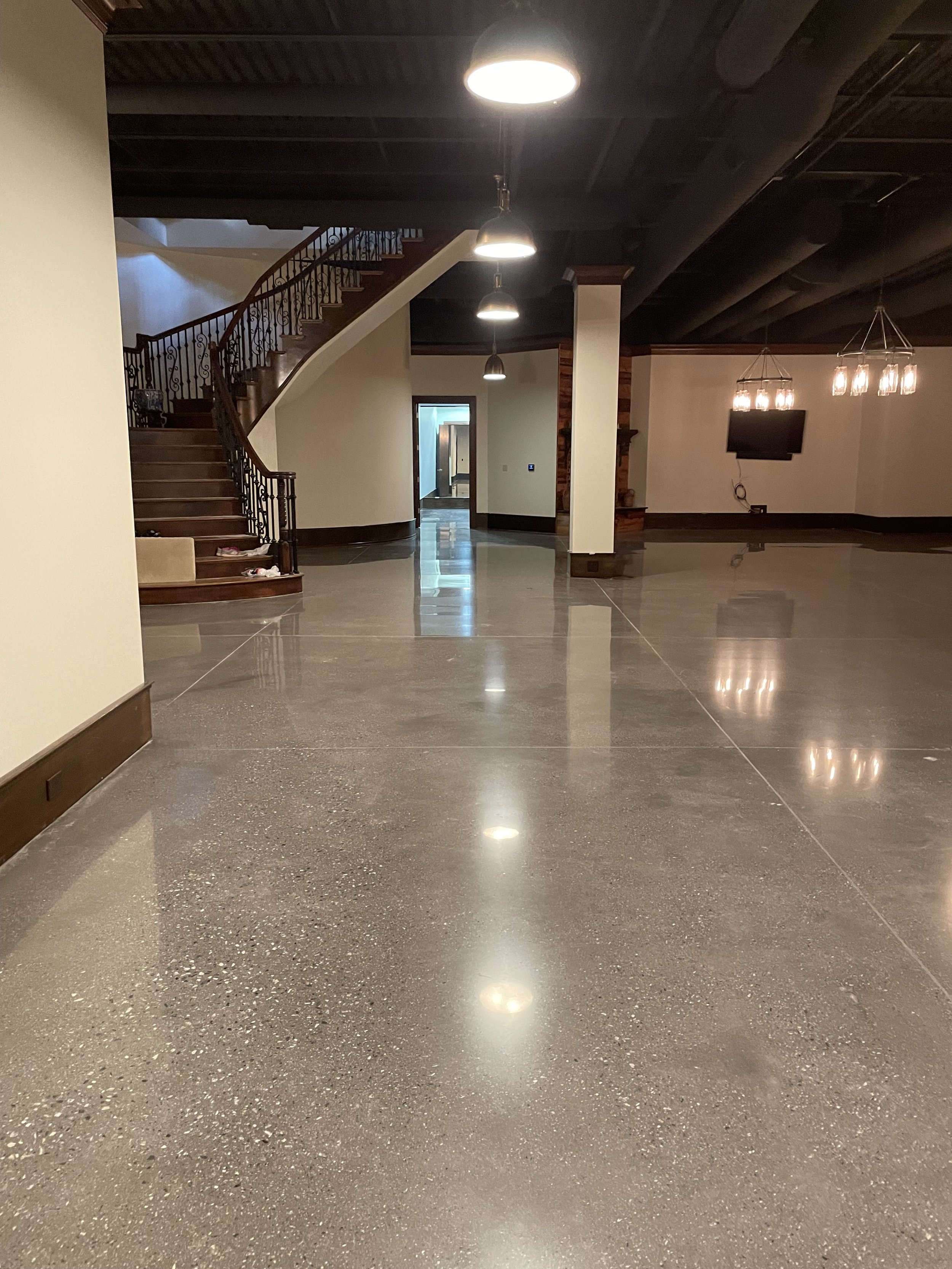Stained Concrete Applications That Bring a Trendy Look to Every Area
Wiki Article
Why Regional Discolored Flooring Is the Perfect Choice for Sustainable Home Enhancement
In the world of lasting home renovation, neighborhood discolored floor covering has arised as a prominent option amongst ecologically conscious house owners. As an economical investment with minimized upkeep needs, it raises a provocative question: could this be the excellent option for sustainable housing?Understanding the Principle of Local Tainted Flooring
While the concept might appear novel to some, neighborhood tarnished floor covering is an ingenious method to home renovation that integrates aesthetic appeals, resilience, and sustainability. The discoloration process not only boosts the natural beauty of the timber grain but additionally adds a layer of protection, boosting the long life of the flooring. Utilizing neighborhood wood varieties commonly sustains local economic situations and promotes responsible forest administration techniques.The Aesthetic Appeal of Regional Discolored Floor Covering
Why is regional discolored floor covering gaining popularity for its aesthetic appeals? The answer depends on the one-of-a-kind appeal and character it brings to any kind of space. Local discolored floor covering supplies a diverse series of patterns and shades, reflecting the natural beauty and variations of the local wood varieties made use of. This develops a special, tailored aesthetic that can not be duplicated by mass-produced choices. Furthermore, the discoloration process boosts the timber's inherent grain and structure, including deepness and splendor to the floor's look. This rustic sophistication flawlessly mixes with various indoor style styles, from standard to contemporary, making it a versatile selection for house owners. Inevitably, the appeal of local tarnished flooring depends on its capacity to transform homes right into distinct, visually appealing rooms while promoting sustainability.Environmental Impacts of Local Tainted Floor Covering
The ecological implications of regional discolored floor covering incorporate 2 significant elements: reducing carbon impact and waste reduction advantages. Making use of locally sourced materials for discoloring not only decreases transport exhausts, but also advertises lasting forestry practices. Furthermore, the waste reduction element enters play as these flooring kinds typically have a longer lifespan, reducing the frequent need for replacements and the waste connected with it.Decreasing Carbon Footprint
As homeowners transform to more lasting choices, neighborhood stained floor covering arises as a viable service to decrease carbon impact. This kind of flooring mainly utilizes locally sourced products, which substantially minimizes the requirement for transport. This reduces emissions connected with freight transport, contributing to reduced degrees of greenhouse gases in the atmosphere. Additionally, the procedure of tarnishing the floor covering, instead of using synthetic coverings, involves less chemicals and less energy-intensive treatments. This results in a decline in carbon emissions throughout the manufacturing process. Selecting local discolored floor covering demonstrates an efficient action in promoting ecological sustainability, highlighting a tangible method home owners can contribute to combating climate modification from the convenience of their very own homes.Waste Reduction Conveniences
Although usually overlooked, waste reduction is one more significant advantage of regional stained flooring. By picking this choice, house owners help in reducing the mass of waste headed to garbage dumps. This floor covering type, generally sourced from regional wood, can be restored, refinished, and reused, including in its durability. Unlike artificial flooring, it does not add to the growth of non-biodegradable waste. Furthermore, the staining procedure utilizes fewer resources and generates much less waste contrasted to manufacturing brand-new floor covering materials. Any kind of waste generated during the staining process is biodegradable and normally natural, mitigating ecological damage. Therefore, the choice of neighborhood tarnished flooring not just enhances homes but also underpins a dedication to sustainable living and waste reduction.
The Longevity and Maintenance of Neighborhood Discolored Floor Covering

The Cost-Effectiveness of Regional Tainted Floor Covering
While regional stained floor covering may originally appear much more expensive than various other choices such as carpeting or laminate, its longevity and resilience quickly transform it into an economical selection. The upfront price is typically countered by the decrease in upkeep expenses gradually. Unlike carpets that need normal deep cleansing or laminate that may need replacement web link after a few years, discolored floorings are built to last, minimizing the requirement for expensive repair work or replacement. Regional sourcing of materials lowers transport expenses, adding to both economic cost savings and a lower carbon footprint. For home owners looking for a lasting, affordable option for their floor covering needs, neighborhood discolored flooring becomes a premium, long-term financial investment that settles over time.
Real Life Examples of Lasting Homes With Regional Tainted Flooring
In the world of lasting home improvement, regional tarnished flooring has emerged as a prominent alternative. To further show its benefits, numerous reality instances of environment-friendly homes that have effectively included this floor covering method will be highlighted. These case researches provide substantial proof of the benefits and effect of making use of regional tarnished floor covering in sustainable homes.
Display: Eco-Friendly Flooring Houses
Checking the globe, one can locate numerous homes that personify the idea of green living through making use of local discolored floor covering. In the heart of Denmark, a minimalist home prides itself on its oak-stained floorings, sourced and dealt with within the neighborhood webpage area. Across oceans in copyright, a modern-day home showcases its abundant, maple-stained floor covering, a testimony to the bountiful neighborhood wood supply. Down under in Australia, a beach house beams with its eucalyptus-stained floors, reflecting the country's native plants. These homes not only showcase the visual versatility of local stained floor covering however likewise its payment to an extra lasting lifestyle. Each flooring narrates of regard for the atmosphere, showing that design and sustainability can without a doubt coexist.Regional Tainted Floor Covering Benefits
The indisputable appeal of neighborhood stained flooring prolongs beyond its visual charm, as it additionally offers substantial benefits to both house owners and the setting. This kind of floor covering is sourced and generated in your area, decreasing transport exhausts and strengthening the neighborhood economy. The discoloration procedure utilizes natural, safe products, promoting indoor air quality and reducing the home's ecological footprint. In a sustainable home in Rose city, Oregon, for example, regional stained concrete floors not just improve the aesthetic appeals however also work as thermal mass, soaking up warm throughout the day and releasing it during the night, decreasing power use. An additional example is a green-certified home in Austin, Texas, where in your area sourced walnut was discolored and used for floor covering, adding to the home's LEED qualification.Verdict
In final thought, neighborhood tarnished floor covering is a sustainable and sensible option for home renovation. This choice sustains neighborhood economic climates, minimizes environmental effect, and boosts home looks. Its sturdiness makes certain durability, reducing maintenance expenses in the future. With its distinct blend of environmental, aesthetic and affordable advantages, neighborhood stained flooring is a clear option for home owners looking for a lasting, cost-effective and visually attractive home improvement service.informative post
In the realm of lasting home improvement, neighborhood stained floor covering has emerged as a preferred choice amongst ecologically conscious house owners. Local stained floor covering supplies a diverse variety of shades and patterns, reflecting the all-natural beauty and variations of the regional wood species utilized. The choice of neighborhood stained flooring not only enhances homes yet additionally underpins a dedication to lasting living and waste decrease.
For home owners seeking a lasting, economical service for their flooring needs, local tarnished floor covering arises as a premium, lasting financial investment that pays off over time. Stained Concrete.
With its special blend of environmental, aesthetic and economical advantages, regional discolored flooring is a clear selection for homeowners seeking a sustainable, cost-effective and aesthetically attractive home enhancement service.
Report this wiki page